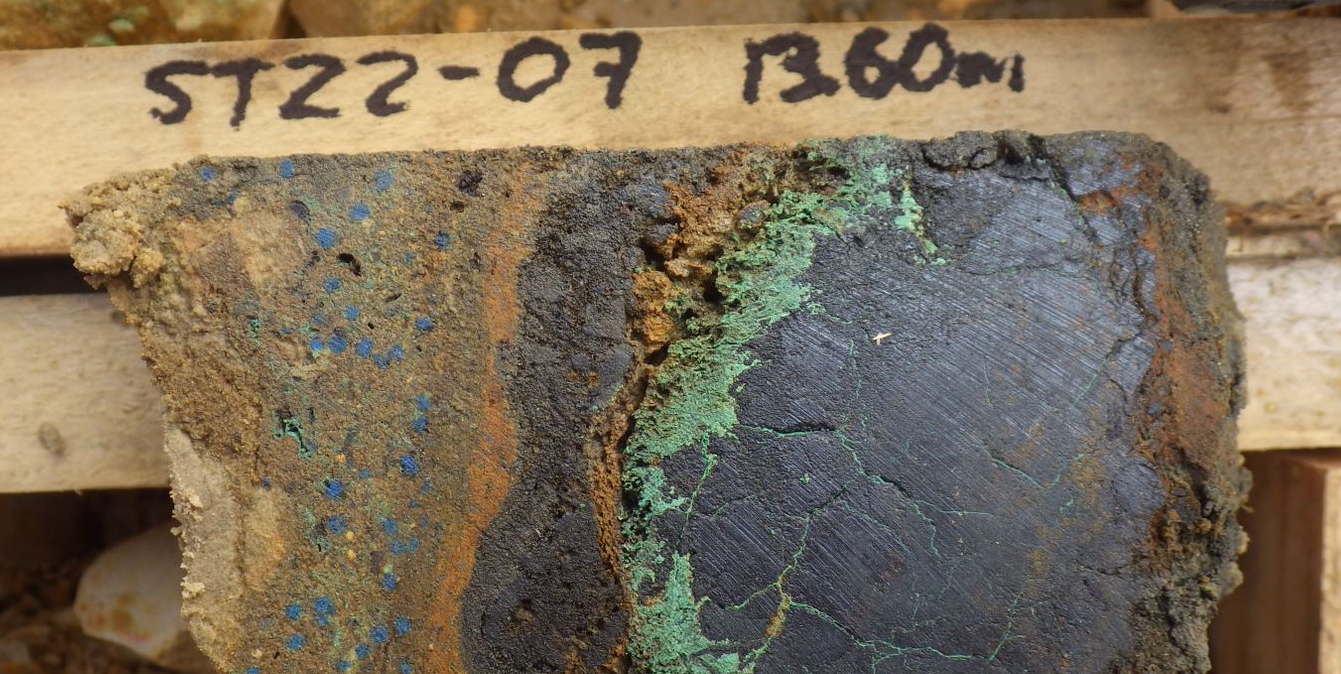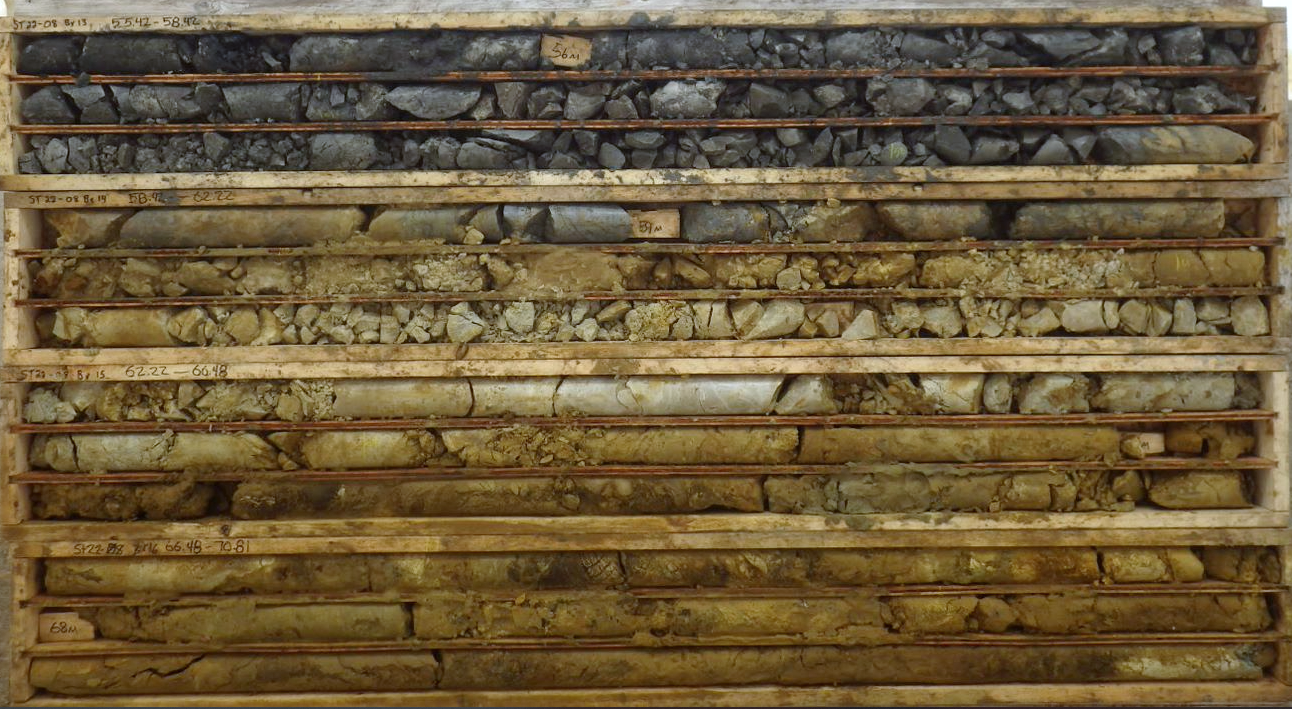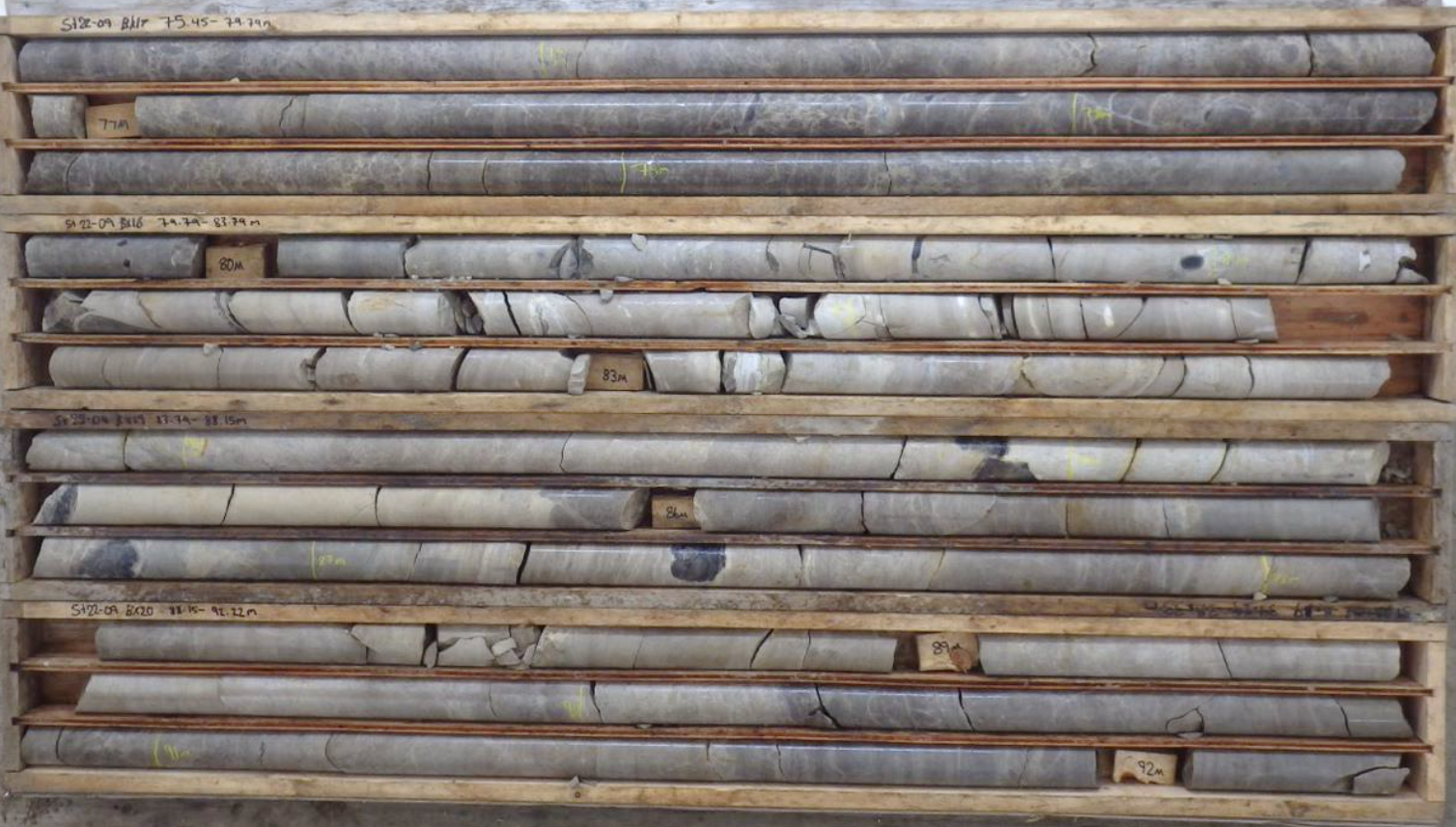Aston Bay Announces Additional Near Surface Copper Mineralization and Expansion of High Grade 2750N Zone at Storm Project, Nunavut
TORONTO, ON / ACCESSWIRE / August 25, 2022 / Aston Bay Holdings Ltd. (TSXV:BAY)(OTCQB:ATBHF) ("Aston Bay" or the "Company") is pleased to announce visual results from three more diamond drill holes at the Company's high-grade Storm Copper Project ("Storm" or the "Project") on Somerset Island, Nunavut. This is the maiden drilling program for American West Metals Limited ("American West"), who are the project operator, since entering an option agreement with Aston Bay in March 2021.
Highlights
- Drilling at the high-grade 2750N Zone continues to expand footprint of the near surface mineralization
- The latest resource drill holes along strike from 2750N have intersected wide intervals of visual copper mineralization, including:
- ST22-07 has intersected 43.5m of mineralization including 15.5m of breccia and massive copper sulfides over multiple intervals
- ST22-08 has intersected 30m of mineralization including 13m of breccia and massive copper sulfides over multiple intervals
- The copper mineralization within the 2750N Zone remains open along strike and at depth
"Drilling at the 2750N Zone continues to impress the team, with thick intervals of copper mineralization near the surface in every drill hole," stated Thomas Ullrich, CEO of Aston Bay. "This gives us confidence in the continuity of the mineralization and the exploration potential for more, in an area where we are working with our partner American West to define a shallow copper resource that can support a low cost, small footprint direct shipping product mining operation. Together with the exciting discovery of a zone of stratiform ‘sediment hosted style' of copper mineralization announced earlier this week, this has been an outstanding drill program and a real game changer for the Storm project."

Figure 1: Diamond drilling underway at the 2750N Zone where further outstanding intervals of near surface copper mineralization have been encountered.
2750N Zone: Expanding the Mineralized Footprint
Drill holes ST22-07 and ST22-08 have been completed at the 2750N Zone and have successfully intersected further thick zones of breccia and massive sulfides (mostly chalcocite) hosted within much broader intervals of vein and fracture style copper mineralization.
A total of 997 metres (m) of drilling has been completed to date on the shallow and high-grade 2750N Zone, with the drilling continuing to confirm the outstanding continuity and thickness of the ore system (Figure 2). The latest drill holes have failed to close off the mineralization which remains open along strike to the east and west, and at depth.
The mineralization encountered within the latest drill holes is visually similar to the previous drilling with chalcocite being the dominant mineral, and with chalcopyrite, bornite, cuprite and minor oxides being present within certain intervals.
The potential for further mineralization and extensions to the 2750N Zone is supported by strong copper anomalism in soils and rock chips along an extensive strike of the known mineralization. Massive chalcocite has been mapped in outcrop on the western margin of the 2750N Zone, with assays of rock chips up to 62% copper. The geochemical footprint defined by soil and rock chip sampling extends for over 1 kilometre (km) along the main strike of the 2750N Zone (Figure 3).

Figure 2: Plan view of the 2750N drill holes and displaying the mineralized intervals (visual). The mineralization shows strong continuity and thickness. True lengths of intersections in the inclined drill holes are approx. 40% greater than they appear in plan view; stated drill hole intersections are all core length, and true width is expected to be 60% to 95% of core length.

Figure 3: Plan view of the 2750N Zone area showing soil geochemistry and gossans overlaying drilling. The known 2750N Zone mineralization is highlighted in red, and forms part of a 1km east-west orientated prospective horizon.
DRILL HOLE ST22-07 DETAILS
ST22-07 was drilled to a downhole depth of 101m to the west of historical drill hole ST99-19 (56.3m* @ 3.07% Cu from 12.2m). The drill hole intersected thick intervals of strong visual mineralization. Importantly, there is no drilling to the west of ST22-07 and the 2750N Zone remains open in this direction towards a known copper gossan.
Table 1 summarises the mineralization as observed in ST22-07. Intersections are expressed as downhole widths and are interpreted to be close to true widths. Visual estimates of sulfide type, quantity and habit should not be considered a substitute for laboratory assays. Laboratory assays are required to determine the widths and grade of mineralization as reported in preliminary geological logging.
| Hole ID | From (m) | To (m) | Min | Description (Sulfide volume within interval) |
| ST22-07 | 11 | 14 | cc/ml/cv | Abundant fractures and veinlets with bands of massive sulfides (10-15%) |
| 14 | 26 | ml/az/sp/cc | Fractures and crackle breccias throughout (1-2%) | |
| 31 | 34 | cc/py | Blebs of sulfides and within fractures (1-2%) | |
| 34 | 38 | cc/py | Breccia with strong matrix and 50cm band of massive sulfides (30%) | |
| 38 | 40 | cc/py | Blebs of sulfides and within fractures (1-2%) | |
| 40 | 46 | cc | Chalcocite throughout as large blebs, fractures and massive sulfide beds (5-10%) | |
| 46.5 | 47.5 | cc | Veinlets and breccias within matrix of chalcocite (2-5%) | |
| 47.5 | 53.5 | cc/py | Trace blebs of sulfides (1%) | |
| 53.5 | 55 | cc/sp | Abundant breccia with chalcocite matrix. Cross cutting veinlets of sphalerite (5%) | |
| 55 | 60 | cc/py | Fractures and localized minor breccias (1-2%) |
Table 1: Description of intervals with visually identified mineralization in drill hole ST22-07. Mineralogy key is cc = chalcocite, bn = bornite, chpy = chalcopyrite, py = pyrite, az = azurite, ml = malachite, cv = covellite

Figure 4: Drill core from ST22-07 from 13.6m downhole showing a mix of copper oxides developed on the outside edge of a massive chalcocite band (azurite - blue, malachite - green/aqua, chalcocite - dark grey).
DRILL HOLE ST22-08 DETAILS
ST22-08 was drilled to a downhole depth of 107m and was designed to test the eastern extent of mineralization in the vicinity of historical drill hole ST99-22 (14.1m* @ 1.6% Cu from 44.3m). The mineralization encountered within ST22-08 appears much stronger than that in ST99-22, and is composed of massive and semi-massive copper sulfides, indicating a potential pinch and swell along the strike of the ore zone. There is no drilling along the projected strike of the 2750N Zone east of ST22-08.
Table 2 summarises the mineralization as observed in ST22-08. Intersections are expressed as downhole widths and are interpreted to be close to true widths. Visual estimates of sulfide type, quantity and habit should not be considered a substitute for laboratory assays. Laboratory assays are required to determine the widths and grade of mineralization as reported in preliminary geological logging.
| Hole ID | From (m) | To (m) | Min | Description (Sulfide volume within interval) |
| ST22-08 | 0 | 14 | cc/py | Massive dolomite lightly veined with chalcocite, pyrite and calcite (1%) |
| 16.5 | 19.5 | sp | Carbonate replacement and sphalerite within pseudo breccia / zebra dolomite (2-5%) | |
| 24 | 25.5 | cc/py | Locally brecciated with abundant cc matrix (5-7%) | |
| 55 | 59.5 | cc | Local massive sulfide beds within network of veins and fractures (20-30%) | |
| 64 | 71 | cc?/py? | Heavily altered and fractured dolomite with black solid breccia and vein fill (10-20%) |
Table 2: Description of intervals with visually identified mineralization in drill hole ST22-08. Mineralogy key is cc = chalcocite, bn = bornite, chpy = chalcopyrite, py = pyrite, Cu = native copper, ml = malachite, cv = covellite

Figure 5: Drill core from ST22-08 between 55.42 and 70.81m downhole - note chalcocite (dark grey) in upper core box
DRILL HOLE ST22-09 DETAILS
ST22-09 was drilled to a downhole depth of 155m and was designed to test a high-priority fixed-loop electromagnetic (EM) anomaly that was defined in the 2021 FLEM survey.
The targeted anomaly is interpreted to be steeply dipping and located immediately adjacent to a large copper gossan. The plate dimensions are modelled as 85m across by 419m deep.
Drill hole ST22-09 intersected three zones of weak vein style and fracture hosted copper mineralization. Whilst confirming the presence of copper mineralization, these intervals are not sufficient to determine the source of the EM anomaly and suggest that ST22-09 may have been drilled proximal to the primary target. Further, closer spaced EM (including downhole EM) will now be used to constrain the EM model for follow-up drilling.
Table 3 summarises the mineralization as observed in ST22-09. Intersections are expressed as downhole widths and are interpreted to be close to true widths. Visual estimates of sulfide type, quantity and habit should not be considered a substitute for laboratory assays. Laboratory assays are required to determine the widths and grade of mineralization as reported in preliminary geological logging.
| Hole ID | From (m) | To (m) | Min | Description (Sulfide volume within interval) |
| ST22-09 | 79.5 | 80.2 | cc | Chalcocite veinlets in brecciated dolomite |
| 116.7 | 122.2 | ml | Brecciated and laminated dolomudstone with malachite along fractures | |
| 139.7 | 146.5 | ml | Carbonate veins and veinlets with malachite |
Table 3: Description of intervals with visually identified mineralization in drill hole ST22-03. Mineralogy key is cc = chalcocite, bn = bornite, chpy = chalcopyrite, py = pyrite, Cu = native copper, az = azurite, ml = malachite

Figure 6: Drill core from ST22-09 between 75.45and 92.22m downhole showing dark gray chalcocite veining
DRILLING PROGRAM SUMMARY
Table 4 shows details for drill holes completed at the Storm Project in the current program. A total 1,534.6m has been drilled to date.
The shallow drilling completed at the 2750N Zone continues to highlight the quality and continuity of the high-grade near surface mineralization. These latest drill holes are expected to add a significant volume of mineralization to that encountered by historical drilling in this zone, including 110m* at 2.45% Cu from surface (drill hole ST97-08), and 56.3m* @ 3.07% Cu from 12.2m* (drill hole ST99-19). The 2750N Zone copper mineralization remains open at depth and along strike with strong potential for further drilling to continue expanding the volume of mineralization in this area.
The exploration phase of the current program has immediately delivered success with the discovery of a new potentially major copper mineral system within the Storm Project. The early indications from the mineralization intersected to date strongly suggest a large-scale stratiform sedimentary copper deposit model (see news release dated August 23, 2022).
| Hole ID | Prospect | Easting | Northing | Depth (m) | Azi | Dip |
| ST22-01 | 2750N | 466230 | 8172841 | 128 | 180 | -50 |
| ST22-02 | 2750N | 466202 | 8172763 | 155 | 360 | -65 |
| ST22-03 | 2750N | 466293 | 8172778 | 119 | 359 | -68.6 |
| ST22-04 | 2750N | 466276 | 8172827 | 146 | 182 | -60.3 |
| ST22-05 | 2750N | 466275 | 8172827 | 89 | 180 | -45.8 |
| ST22-06 | 2750N | 466177 | 8172827 | 152 | 180 | -53 |
| ST22-07 | 2750N | 466164 | 8172804 | 101 | 197 | -52 |
| ST22-08 | 2750N | 466328 | 8172822 | 107 | 180 | -55 |
| ST22-09 | Loop10_1 | 466948 | 8172552 | 155 | 018 | -60 |
| ST22-10 | Loop7_2 | 464323 | 8174299 | 382.6 | 180 | -68.4 |
Table 4: Drill hole details
PLANNED PROGRAM
Further diamond drilling and surface electromagnetics are planned to follow-up the 2750N Zone, ST22-09 anomaly and the new discovery. The drilling will also aim to define initial resources at the 4100N and 2200N Zones, where thick zones of high-grade copper mineralization have been intersected in historical drilling.
The EM will most likely consist of closely-spaced stations and moving loop configuration to better constrain the modelling. Downhole EM (DHEM) will also be used on all recent drill holes.
A detailed geophysical review will be completed with the aim of refining the current targets and planning follow-up surveys. Future surveys may include gravity, magnetics and further EM surveys.
Assays for all drill holes are pending and are expected in the coming weeks.

Figure 7: Soil and rock chip sampling underway at the 2750N Zone.
About the Storm Copper and Seal Zinc-Silver Projects, Nunavut
The Nunavut property consists of 117 contiguous mining claims and six prospecting permits covering an area of approximately 302,725 hectares on Somerset Island, Nunavut, Canada. The Storm Project comprises both the Storm Copper Project, a high-grade sediment hosted copper discovery (intersections including 110m* @ 2.45% Cu from surface and 56.3m* @ 3.07% Cu from 12.2m) as well as the Seal Zinc Deposit (intersections including 14.4m* @ 10.58% Zn, 28.7g/t Ag from 51.8m and 22.3m* @ 23% Zn, 5.1g/t Ag from 101.5m). Additionally, there are numerous underexplored targets within the 120-kilometre strike length of the mineralized trend, including the Tornado copper prospect where 10 grab samples yielded >1% Cu up to 32% Cu in gossans.
*Stated drillhole intersections are all core length, and true width is expected to be 60% to 95% of core length.

Figure 7: Storm Copper Project, Location Map.
Qualified Person
Michael Dufresne, M.Sc., P.Geol., P.Geo., is a qualified person as defined by National Instrument 43-101 and has reviewed and approved the scientific and technical information in this press release.
About Aston Bay Holdings
Aston Bay is a publicly traded mineral exploration company exploring for base metals and gold deposits in Virginia, USA, and Nunavut, Canada. The Company is led by CEO Thomas Ullrich with exploration in Virginia directed by the Company's advisor, Don Taylor, the 2018 Thayer Lindsley Award winner for his discovery of the Taylor Pb-Zn-Ag Deposit in Arizona. The Company is currently drilling the Mountain Base Metals Project in Virginia, exploring the Buckingham Gold Project, also in Virginia, and is in advanced stages of negotiation on other lands in the area.
The Company is also 100% owner of the Storm Project property, which hosts the Storm Copper Project and the Seal Zinc Deposit and has been optioned to American West Metals Limited.
About American West Metals Limited
AMERICAN WEST METALS LIMITED (ASX: AW1) is an Australian company focused on growth through the discovery and development of major base metal mineral deposits in Tier 1 jurisdictions of North America.
They are a progressive mining company focused on developing mines that have a low-footprint and support the global energy transformation.
Their portfolio of copper and zinc projects include significant existing mineral resource inventories and high-grade mineralization that can generate robust mining proposals. The company is commitment to the ethical extraction and processing of minerals and making a meaningful contribution to the communities where our projects are located.
The company is led by a highly experienced leadership team, with strategic initiatives that lay the foundation for a sustainable business which aims to deliver high-multiplier returns on shareholder investment and economic benefits to all stakeholders.
For further information on American West, visit: www.americanwestmetals.com.
FORWARD-LOOKING STATEMENTS
Statements made in this news release, including those regarding the Option Agreement, grant of the Option and the expected closing date, American West's interest in the Storm Project and its other acquisitions and plans, plans for the upcoming field season, management objectives, forecasts, estimates, expectations, or predictions of the future may constitute "forward-looking statement", which can be identified by the use of conditional or future tenses or by the use of such verbs as "believe", "expect", "may", "will", "should", "estimate", "anticipate", "project", "plan", and words of similar import, including variations thereof and negative forms. This press release contains forward-looking statements that reflect, as of the date of this press release, Aston Bay's expectations, estimates and projections about its operations, the mining industry and the economic environment in which it operates. Statements in this press release that are not supported by historical fact are forward-looking statements, meaning they involve risk, uncertainty and other factors that could cause actual results to differ materially from those expressed or implied by such forward-looking statements. Although Aston Bay believes that the assumptions inherent in the forward-looking statements are reasonable, undue reliance should not be placed on these statements, which apply only at the time of writing of this press release. Aston Bay disclaims any intention or obligation to update or revise any forward-looking statement, whether as a result of new information, future events or otherwise, except to the extent required by securities legislation.
For more information contact:
Thomas Ullrich, Chief Executive Officer
thomas.ullrich@astonbayholdings.com
416-456-3516
Salisha Ilyas, Investor Relations
salisha.ilyas@astonbayholdings.com
647-209-9200
SOURCE: Aston Bay Holdings Ltd
View source version on accesswire.com:
https://www.accesswire.com/713464/Aston-Bay-Announces-Additional-Near-Surface-Copper-Mineralization-and-Expansion-of-High-Grade-2750N-Zone-at-Storm-Project-Nunavut